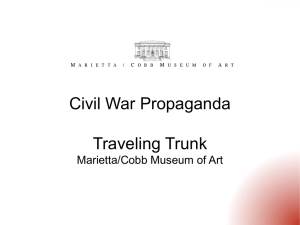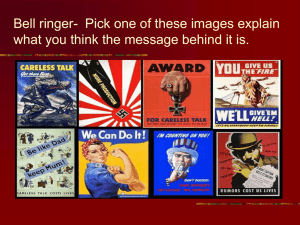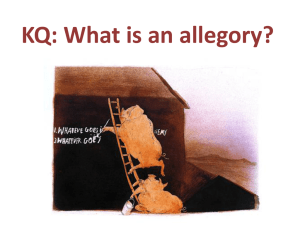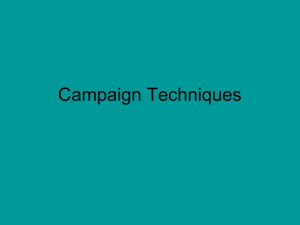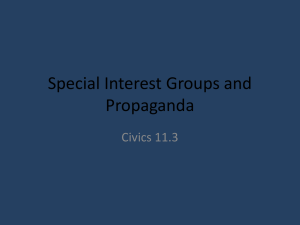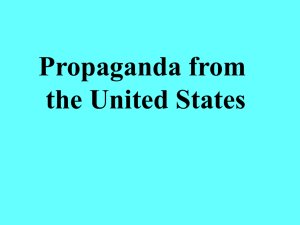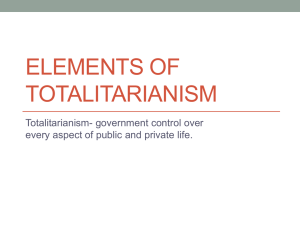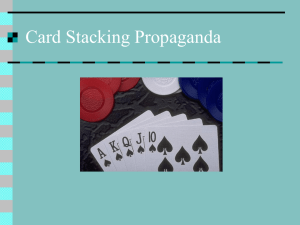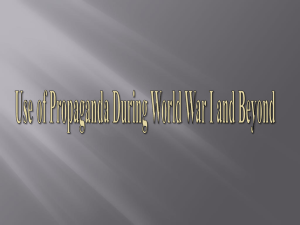Week 3
advertisement
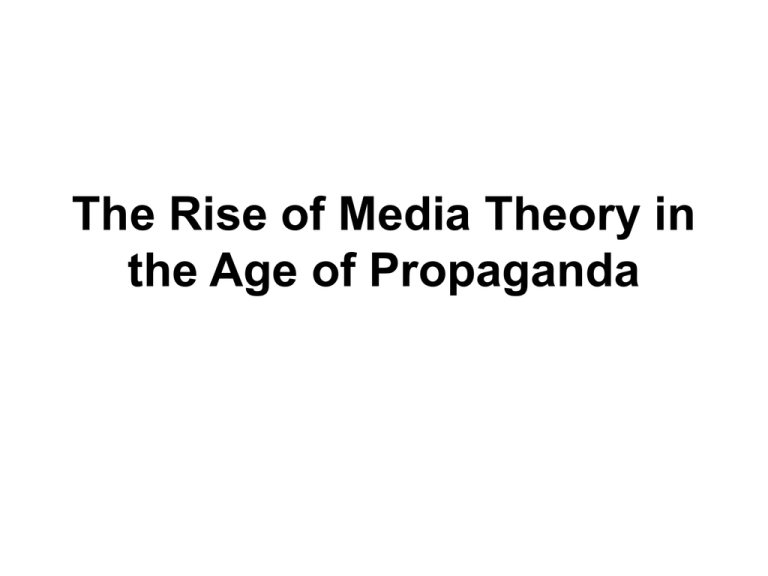
The Rise of Media Theory in the Age of Propaganda • • • • • • • • Unlike mass society theory, propaganda theory argues mass media’s content influence should be the focus of analysis. In 1930s totalitarian propagandists use media to convert millions to their ideas. The question is should media be completely free of controlled or censored. In 1930s European migrants in the States joint extreme political movements supporting some totalitarian regimes like Adolf Hitler of Joseph Stalin. For totalitarian propagandists, mass media were conceptualized as a very practical means of mass manipulation. In 1930s, in the states movies and radio were controlled by the existing elites. Extremist were often forced to rely on older media like pamphlets, handbills and political rallies. Propaganda theorists state that propaganda should be resisted. For Fritz Hippler propaganda is to simplify the issue and repeat it over and over again. For J. Michael Sproule it is persuading people without seeming to do so. Propagandists believe that end justifies the means. Propaganda relies on DISINFORMATİON (false and misinformation) to discredit the opposition. • WHITE PROPAGANDA concept was developed still has been using today in PRA. This is a technique use to promote positive information or ideas to distract attention from problematic events. • BLACK PROPAGANDA is deliberate transmission of lies. • GRAY PROPAGANDA is transmission of information or ideas that might be might not be false. No effort is made to determine their validity. • Propaganda theories developed in 1930s influenced by Behaviorism and Freudianism Behaviourism claims media provide external stimuli that triggered immediate responses • stimulus response psychology • human action is conditioned to external stimuli • consciousness rationalized behaviours after they are triggered by external stimuli • by studying association between stimuli and behaviors, these theorists hope to discover the unknown causes for action. Freudianism, (human behavior is product of the conflict between id, ego, and superego) • Self has fragmented parts like id, ego, and superego. Ego (the rational mind) is in control, but sometimes human behavior is under the control of darker part of the human mind which is id ( egocentric, pleasure seeking part of self). Ego relies on internalized set of cultural rules (the superego) for guidance. • If propaganda appeals to the id and stimulate it to overwhelm the ego. Combination of Behaviourism and Freudianism? ‘Propaganda messages were like magic bullets that could easily penetrate even the strongest defenses’ Media could operate as external agents and be used as tools to manipulate essentially passive mass audiences. • Media stimuli operates like magic bullet penetrating human minds and creating strong emotions and transform how they think and feel. • This theory hope that people can be conditioned to generate good emotion with their country and bad emotions with enemies. • People are powerless before media messages. • The rational mind is incapable of resisting powerful messages. Lipmann’s Theory of Public Opinion Formation Lipmman sharing the skepticism of Lasswell focused on the discrepancies between the world outside and the pictures in our heads. • People couldn’t learn enough from media to help them understand. Psychological and social barriers that prevented average people from developing useful pictures in their heads. (a steel worker doesn’t understand physics, so why should he be expected to understand politics?) • Public was vulnerable to propaganda. Media control is necessary. Self censorship wouldn’t be enough. • Control of information gathering and distribution in the hands of technocracy who are using scientific method. • Lipmann suggests the establishment of quasi governmental intelligence bureau to evaluate information.. Public Education by J. Dewey • When media assume the role of external agents and work manipulate the pictures in people’s heads, they become just another competitor for our attention.Dewey proposed public education against totalitarianism. • People could learn how to resist propaganda methods simply by gaining rudimentary education. • Media’s job is ‘’to interest the public in the public interest’’ Media should be understood not an external agent but as provider of public debate. • Newspapers should provide public education and debate, teach critical thinking skills, structure public discussions. • Dewey’s belief ‘s the heart of the growing media literacy movement and also it gives inspiration to cultural studies area. Modern Propaganda Theory Comes from critical theory and political left.The subject of this theory is political ads and discourse.Their argument is that powerful elites control the media and their content to impose their truth. • Herman’s five filters for bridging media business and other formal or informal agencies like governments, collectives and lobbies to create confusion. - ownership -advertising -sourcing -flack -belief in the miracle of the market. R. Laitinen and R. Rakos’ (1997) critical view • the control over behavior by media manipulation is facilitated by three factors, • a harried lifestyle, less well-informed, and less politically involved, • surveys results are used to increase propagandists’ influence, • the incorporation of media companies into megaconglomorates.
